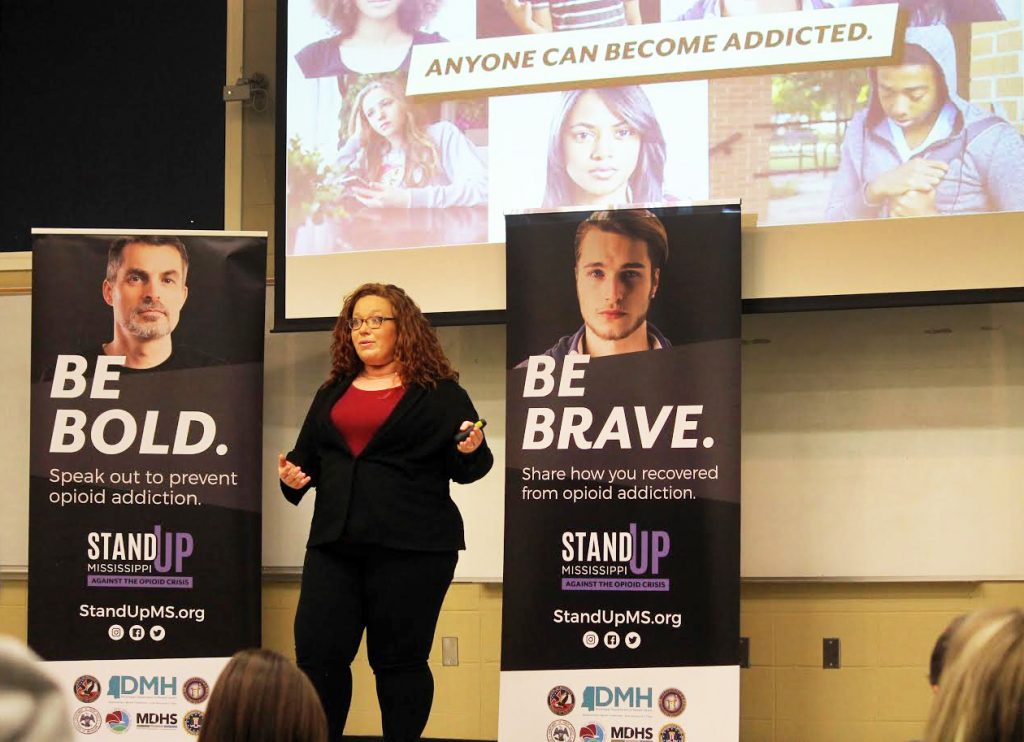Mississippi organizations concerned with the state’s ongoing struggle with opioid abuse came together on campus Tuesday night to highlight the importance of students’ involvement in combating the crisis.
The Mississippi Board of Pharmacy partnered with The Mississippi Bureau of Narcotics, the Jackson division of the FBI, the Department of Mental Health and Stand Up, Mississippi to host an opioid forum on campus, where representatives discussed methods to curb rates of opioid abuse.
Sid Seal, compliance agent for the Mississippi Board of Pharmacy, said the town hall meeting was the 33rd forum that has been conducted since the organizations’ partnership began. Started around a year and a half ago, this is the fifth forum to happen on a Mississippi college campus.

Angela Mallette, Outreach Coordinator of Stand Up Mississippi, speaks at the Opioid Forum on Tuesday night. Photo by McKenzie Richmond
“The leaders of all these different agencies got together, and we said ‘We have to take this message out the to community,’” Stand Up, Mississippi outreach coordinator Angela Mallette said. “It’s a personal conviction for all of us.”
Opioid addiction has been declared a national crisis as many people across the nation are abusing the drug. Opioids are broken down into three classes which are prescription drugs, fentanyl and heroin. According to the National Institute on Drug Abuse, around 21 to 29 percent of patients prescribed opioids for chronic pain misuse them.
“The opioid crisis is getting bigger and bigger,” Seal said. “This is a real deal. This is not just something that is built up to have a political agenda.”
Mississippi Bureau of Narcotics Lt. John Harless said approximately 198 people die each day from an accidental drug overdose in the United States, and 134 of those deaths involve an opioid. In 2017, 256 people died of overdoses in Mississippi, and 74 percent of those overdoses involved opioids. He said there were 183 million dosage units of opioids dispensed in Mississippi in 2017.
“It’s very easy to stereotype what a drug addict looks like,” Harless said. “I will tell you in my 20 years of doing this, you can’t stereotype an opioid addict. You name it, and they function through the illness. Nobody wakes up and says, “This is the day I’m going to become a heroin addict, this is the day I’m going to stick a needle in my arm.’”
Zach Pandelidies, a postdoctoral research associate in the department of biomolecular science, recently moved to Mississippi from Canada and said he was not aware of the widespread opioid abuse in the United States.
“I didn’t realize that (Americans) used opioids to such a level,” Pandelidies said. “Over 80 percent of opioids consumed in the world are consumed in the United States.”
Zachary Miller, a pharmacy graduate student, said he attended the meeting because of personal exposure to opioid misuse.
“I’ve had a little brother from my fraternity actually die from an opiate overdose,” Miller said. “After that, I, myself, got a Narcan prescription through the statewide order and gave that to a friend (who) was able to save someone from the overdose.”






